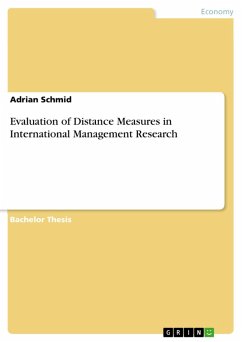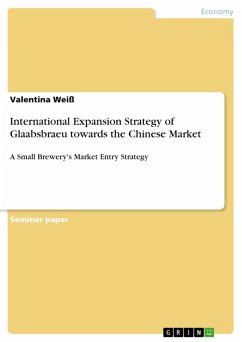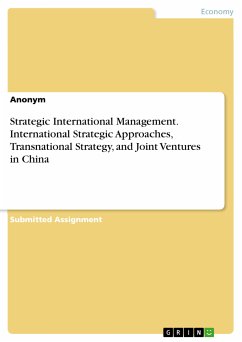Bachelor Thesis from the year 2013 in the subject Business economics - Business Management, Corporate Governance, grade: 2.0, University of Tubingen (Department of International Business), language: English, abstract: This paper's purpose is to give an overview of how distance in management research is measured and to overview the strong critique the corresponding measures have to face. The paper's investigation brought several findings: firstly that frameworks in which distance constructs develop are too wide in their definition and that these frameworks are insufficiently connected to each other what impedes the improvement of the strong criticised but in management research essential constructs. Secondly the paper illustrates the widespread disagreement among researchers and literature. The paper gives suggestions how distance measures could be improved and contributes to a more "outside of the box thinking" by considering the whole distance construct. Furthermore it helps to build unbiased opinions of the thematic by not taking a side or giving suggestions whether on construct is superior towards another. Due to rising internationalization of businesses and the circumstance of having business partners, suppliers and clients placed all around the world, companies are fronting challenges like diversities in lifestyles, languages, cultural values and norms, consumer preferences and buying power. So it is not surprising that these differences or distances became an increasingly important topic in international management research. Distance aspects are important for companies in evaluating and improving their international strategies in nearly every field of business, especially when it comes to expansions in foreign investments through direct investments, international transactions and joint ventures. In purpose to be able to identify the extent of difference between countries, that Hymer called "liability of foreignness", management scholars evolved a broad range of quantitative and qualitative distance measures based on different assumptions and methods. But although the concepts play an important role in international management research and although they are widely used in international business practice to support or to improve companies' decision-making process, they face strong criticism and contradiction.
Dieser Download kann aus rechtlichen Gründen nur mit Rechnungsadresse in A, B, BG, CY, CZ, D, DK, EW, E, FIN, F, GR, HR, H, IRL, I, LT, L, LR, M, NL, PL, P, R, S, SLO, SK ausgeliefert werden.









